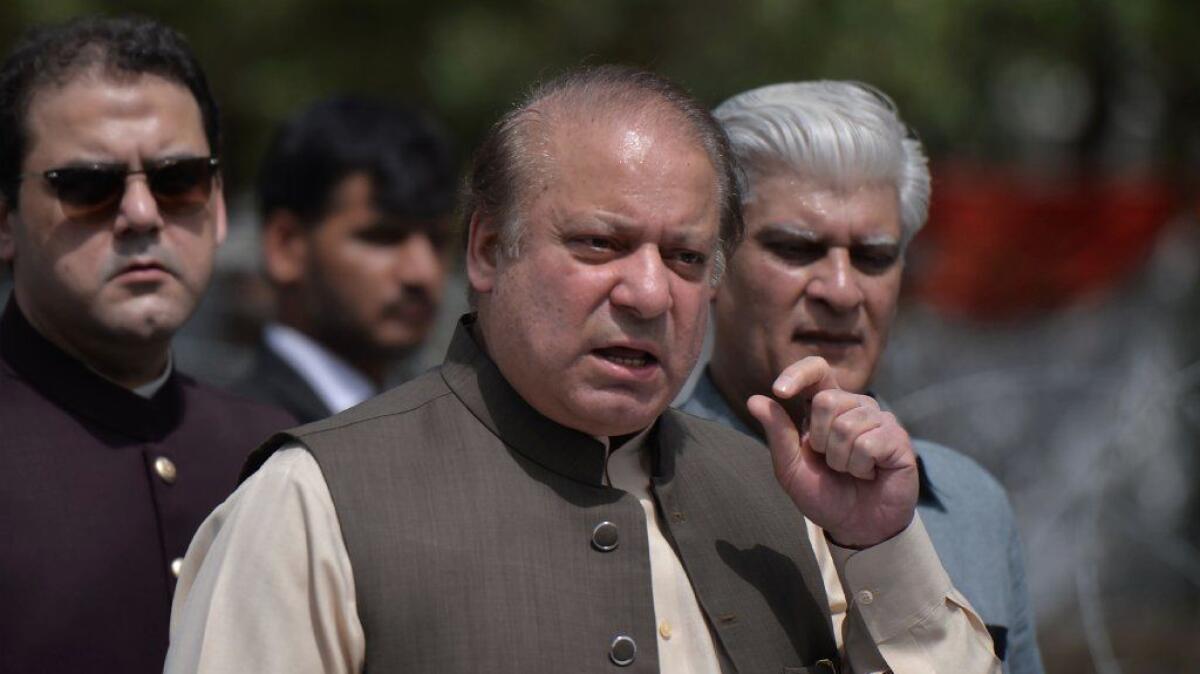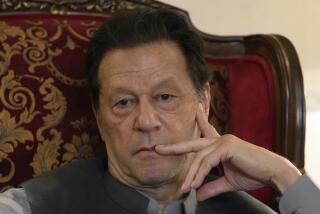The Panama Papers and a Microsoft font could bring down the government in Pakistan

Reporting from Islamabad, Pakistan — In Pakistan’s short, turbulent history, every prime ministership has ended in dismissal, resignation, assassination or a military coup. No premier in 70 years has completed the full five-year term.
Prime Minister Nawaz Sharif — who has been ousted twice before — was on track to end that streak. But now he faces a new and unusual type of ignominy: He could be done in by a corruption scandal involving leaked documents, London apartments and a Microsoft font.
Pakistan’s Supreme Court opened hearings Monday following a report by an investigative panel that concluded Sharif, his two sons and daughter had lied about their offshore wealth and held assets they couldn’t afford based on their known sources of income.
The judges could dismiss Sharif from office or order him to be tried on charges of corruption and money laundering. The 67-year-old prime minister has denied all the allegations and dismissed the investigation into his wealth as a “piece of trash.”
The saga – a Shakespearean drama updated for the computer age – has gripped a country accustomed to political turmoil and rocked a government that until recently seemed likely to finish its term next year and even win re-election based on its economic record.
“It is a strange case,” said Khawar Ghumman, a journalist and political commentator in Islamabad.
Last year, Sharif became one of the highest ranking world leaders to be touched by the “Panama Papers” – documents leaked from a Panamanian law firm that revealed how some of the world’s rich and well connected stash their wealth in secret accounts overseas.
The documents showed that Sharif’s two sons and a daughter – Maryam Nawaz, his presumed political heir – owned apartments in London’s swanky Hyde Park through two offshore companies based in the British Virgin Islands. While Sharif was not named as owner of any of the properties, political opponents immediately filed lawsuits demanding he explain how his family came to acquire the expensive real estate.
Opposition leader Imran Khan, Sharif’s main rival, then threatened to march on the capital, prompting the Supreme Court to take up the case in November. At the time, it seemed the case would go the way of so many judicial inquiries in Pakistan, delayed and excessively lawyered until it was forgotten.
In April, with pressure from opposition parties rising, the court decided it needed more time and appointed a six-member team to investigate the allegations, although it said Sharif could remain in office.
The investigators issued their 10-volume report last week, and it was a bombshell. It accuses Sharif of lying to investigators about his overseas assets and concealing an offshore company in Dubai, United Arab Emirates, of which he was chairman – and recommended that Sharif and his children be tried for corruption.
Perhaps most embarrassing, the probe found that Maryam Nawaz had falsified documents, dated February 2006, that she said showed that she was not an owner of the two offshore companies but merely a trustee. A British forensics company told investigators that the documents were written in Calibri, a Microsoft sans serif-style font that was not commercially available until 2007.
Suddenly, “font-gate” trended on social media in Pakistan. Headline writers had a field day: “A case of sans serif to sans Sharif,” cackled India’s Economic Times.
“Resignation is not enough,” opposition leader Khan said last week. “The Sharif family’s next home will be Adiala prison.”
Political analysts said the report was damaging enough that the court would be forced to recommend, at the very least, that Sharif be tried on corruption charges.
“I am unable to understand how he will fight back,” said Nasim Zehra, a political analyst in Islamabad. “I don’t think Nawaz Sharif and his family can play the victim card after this extensive report.”
Through it all, Sharif, who had been ousted as prime minister twice before making a political comeback in 2013, has resolutely maintained his innocence. Last month, he took the bold step of bashing the investigation at a news conference in London – outside one of the very apartment buildings at the center of the probe.
On Monday, lawyers representing Sharif argued before the Supreme Court that the investigation team had overstepped its authority and that its findings were “based on orchestrated suspicions and unfounded conjectures.”
Sharif has said he is the target of “conspirators” whom he won’t name – although many analysts believe he is referring to Pakistan’s powerful military establishment, with which he has often clashed. The army has ruled Pakistan for most of its history, and it was then-army chief Gen. Pervez Musharraf who ousted Sharif in a coup in 1999.
Two of the six members of the investigation team are connected to the military, adding fuel to Sharif’s allegations. He has also accused the investigators of failing to interview one of his key witnesses – a former Qatari prime minister, Hamad bin Jassim bin Jaber al Thani, who has said that the London properties were acquired with dividends from investments in Qatari businesses held by Sharif’s late father, a steel tycoon.
The hearing was expected to resume Tuesday and could last several days.
While Pakistan’s Supreme Court has the constitutional authority to declare a sitting official unfit for office, analysts say the judges – who in the past have been criticized as pawns of either the civilian government or the military – are unwilling to take a highly sensitive step that could amount to a “judicial coup.”
Some say the court could take a lesser step of framing charges against Sharif to be heard by the National Accountability Bureau, an anti-corruption body.
“As damning as the report is, [Sharif] will have some credible arguments,” said one analyst in Islamabad who declined to be named because of the sensitivity of the case. “The question is, is it going to be convincing enough for the judges to conclude there’s nothing here. A big part of this is political and about perceptions of the Supreme Court, which the judges are sensitive to.”
The political furor threatens to distract from Pakistan’s significant challenges, including violent attacks by Islamist militants that have killed at least 360 civilians this year, according to the South Asia Terrorism Portal, which tracks the fatalities. U.S. officials view Pakistan, which possesses nuclear weapons and a grudge against neighboring India, as a troublesome but necessary ally in the war in Afghanistan.
Bruce Riedel, director of the Brookings Intelligence Project, wrote in a commentary last week: “Instability in Pakistan is dangerous for the United States and the world.”
ALSO
Finally, visas in hand, Afghan girls depart for the U.S. and a global robotics competition
Special correspondent Sahi reported from Islamabad and Times staff writer Bengali from Mumbai, India.
Follow @SBengali on Twitter for more news from South Asia
More to Read
Sign up for Essential California
The most important California stories and recommendations in your inbox every morning.
You may occasionally receive promotional content from the Los Angeles Times.











